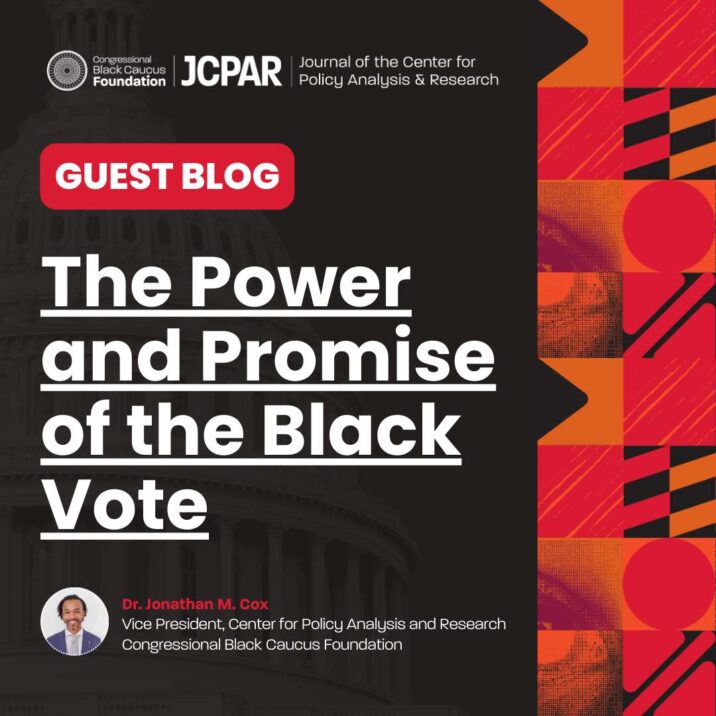By Jonathan M. Cox, PhD
Vice President, Center for Policy Analysis and Research
Congressional Black Caucus Foundation
In our current political landscape, we are witnessing a pivotal moment in history where the power wielded by Black voters is being increasingly recognized and acknowledged—although not always with positive intentions or to positive ends. It is crucial to lean into this moment ahead of the 2024 election and recognize its implications for democracy and Black social life.
A key feature of this moment is that Black representation among elected officials is at its highest level since the Reconstruction Era, which includes 60 Black members of Congress. At the height of the Reconstruction Era, during which Black people took advantage of the passing of laws like the Civil Rights Act of 1875 and the Fourteenth Amendment, it is estimated that around 2,000 Black men served in elected positions throughout the country, including 16 members of Congress and over 600 in state legislatures.
Unfortunately, history shows us that Black progress is almost always met with stark, violent opposition from White Americans, both interpersonal and systemic. The Equal Justice Initiative reports that during the period of Reconstruction, at least 2,000 Black men, women, and children were victims of lynchings and other racial terror attacks committed in response to Black Americans attempting to take advantage of new freedoms, like civic engagement. Systemically, states enacted policies and laws to disenfranchise Black people. Particularly in southern states, restrictive laws around voter registration and elections—such as literacy tests, poll taxes, grandfather clauses, and other features of Jim Crow—in conjunction with ongoing and widespread racial violence, quickly reversed the trends of Reconstruction, drastically reducing the number of registered Black voters and Black elected officials.
It was not until the passing of the Voting Rights Act of 1965 that most of the discriminatory laws and practices put in place to limit Black civic engagement were outlawed, however we know that Black Americans continue to feel the effects of disenfranchisement to this day. Only a decade ago, in the 2013 case Shelby County v. Holder, the U.S. Supreme Court reversed part of the Voting Rights Act, effectively removing federal oversight of state and local voting laws. Since then, several states enacted more restrictive and discriminatory voter laws, which include practices like strict photo ID requirements, reduced early voting, the elimination of same-day registration and annual voter registration drives, and more. And while several groups have successfully sued states for racially discriminatory voting laws, by the time laws are struck down, significant damage has already been done. The fallout from the Shelby ruling continues even until today. Research from the Brennan Center for Justice finds that in 2023, fourteen states passed at least seventeen restrictive voting laws, and over 350 restrictive bills were introduced in 47 states, and at least 141 restrictive bills are up for consideration in 25 states in 2024.
Additionally, issues like political gerrymandering and felony disenfranchisement continue to have significant effects. Many states are redrawing congressional districts in ways that deny Black voters the opportunity to elect candidates of their choice, and because Black people are disproportionately incarcerated in the U.S., 1 in 19 Black Americans of voting age experience felony disenfranchisement, a rate that is 3.5 times higher than that of non-Blacks.
Despite these obstacles, Black Americans have continuously fought for their right to vote and participate in the democratic process. From the civil rights movement of the 1960s to grassroots organizing efforts in the present day, Black communities have been at the forefront of the struggle for political empowerment. This resilience and steadfast determination in the face of adversity speak to the enduring importance of the Black vote in shaping the course of American democracy.
While we are often told that Black people do not vote, this is a stereotype based in misinformation and a lack of historical context. Black people, in fact, are one of the most stable voting blocs in in the U.S.—despite ongoing efforts of disenfranchisement. Moreover, the Black vote has proven to be decisive in key electoral contests, tipping the balance in favor of candidates who prioritize the concerns of Black voters: Black voters, particularly Black women, were critical to President Biden’s 2020 win, and Black voters have demonstrated a crucial role in Democratic coalition, helping to drive progressive issues such as abortion rights and social justice issues. These trends serve as indicators for presidential candidates and other elected officials seeking support from Black communities in this year’s election.
As we approach the 2024 election, it is more important than ever for Black Americans to lean into their electoral power, which means we must remain vigilant and informed. The upcoming issue of the Journal of the Center for Policy Analysis and Research (JCPAR), published by the Congressional Black Caucus Foundation, is one place to seek such education. In this issue, contributors address some of the key issues impacting Black communities, specifically looking at the past five years in order to move us forward. The authors outline policy recommendations in a variety of areas, including Black homeownership, technology and AI, youth gun violence prevention, and educational equity.
The implications of this moment extend far beyond electoral politics, shaping the very trajectory of democracy and social life in America. By harnessing the collective power of the Black vote, we can effect meaningful change and advance a more just and equitable society for future generations.
